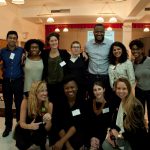The annual SXSW Conference that sweeps through the city of Austin, Texas, each March has been described as the “world’s fair of the future.” Presenting an eclectic mix of creative innovations spanning film, music, and technology from around the globe, the festival provides a glimpse into the pioneering ideas — from VR/AR to startup and tech creations — that are shaping today’s and tomorrow’s world. This year, celebrating its 25th anniversary, SXSW 2018 also marked the launch of an expanded social impact program that was not only contained within its dedicated conference track, but permeated conversation across the festival’s 24 wide-ranging tracks. Here are my top takeaways for conscious business leaders from the social impact conversation at SXSW 2018:
1. Anyone Can Change the Status Quo
You don’t have to be a social entrepreneur to be a changemaker; everyone has the power to effect change. This is one theme that percolated dialogue at this year’s conference. A recurring message shared with SXSW’s general audience was that everyone has the power to do good. That permeated events from a featured panel entitled “Create the World You Want to Live In,” during which model-turned-coder Karlie Kloss and an Adidas executive shared ways each of us can take steps to help solve the issues we care about — such as voting with our dollars and using coding skills for good — to a day devoted to “Social Good Vibes” at a blockchain-themed house where a panel examined social impact applications of blockchain and Ethereum.
2. Diversity & Inclusion Is No Longer Niche
The growing understanding that diversity fosters innovation and drives market growth was another ubiquitous theme echoed throughout the conference. While conversations about #MeToo and #TimesUp popped up in film and music industry panels, there was a bounty of discussions about the need for more diversity across sectors throughout the social impact track. Issues from improving diversity and reducing harassment in venture capital to increasing the number of women of color and Latinas in Tech and explaining why diversity is not just a gender problem pervaded the interactive festival.
3. Creating Space for Collaboration is Important
Beyond the countless panels, featured speakers, and keynotes (which still very much prevail at this conference), a number of meetups, mentor sessions, and workshops — such as one centered around cross-sector collaborative approaches to solving the 17 Sustainable Development Goals (SDGs) by 2030 — offered interactive opportunities for attendees to connect and collaborate throughout the week. Some of these collaborations where quite unique. Dropbox, for example, infused creative energy into the festival with its teams of artists who co-created live murals focused on reimagining the future, protecting the environment, and standing up for human rights — not only showcasing an example of activism through art, but also highlighting what can emerge from facilitating collaboration.
4. We’re in the Age of the Celebrity Social Entrepreneur
When a celebrity takes up a cause, you know that concept is ripe for mass appeal. That may certainly be the case with actor (and social entrepreneur) Hugh Jackman, who attracted a standing-room-only crowd in a session focused on the mission of his Laughing Man Coffee Company, which donates 100 percent of its profits to support farming communities through the Laughing Man Foundation. The cult of celebrity also surrounded Elon Musk, who in SXSW-crossover-style crashed a Westworld panel, attracting about a 1,000 conference attendees with only 12 hours’ notice, for a surprise session in which the Tesla and SpaceX founder talked about space travel and the future of humanity.
5. Social Impact Has Gone Mainstream
One of my big takeaways from this year’s conference is that the social impact and sustainability conversation has truly gone mainstream. SXSW’s decision to wind down its stand-alone SXSW Eco conference in 2016 and make a concerted effort to integrate social impact, equity, CSR, sustainable business, and wellness topics into this year’s conference is a clear sign of this — not to mention conference goers’ receptivity to exploring these issues.
The bottom line
SXSW has been a cultural force since its launch nearly three decades ago, helping innumerable musicians, filmmakers, innovators, and tech startups build buzz for their projects along the way. If this year’s intentional integration of a social impact stream is any indication, the conference’s attention to such culturally relevant conversation may not only be a reflection of our current zeitgeist, but a sign that the mainstream is ready to tackle difficult dialogue and take action to create positive social and environmental impact. I, for one, look forward to what’s in store for next year.





